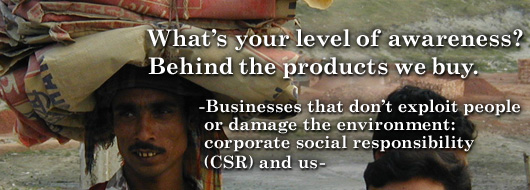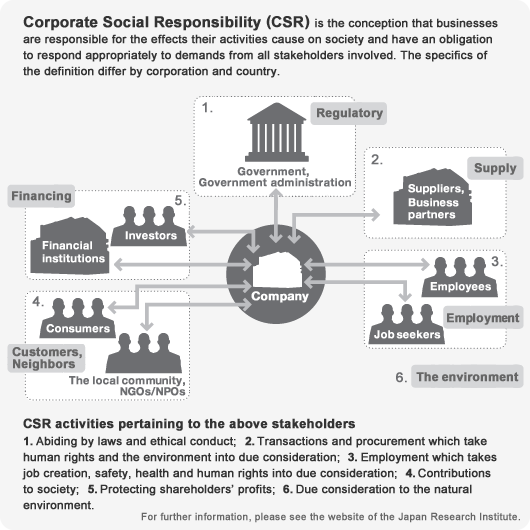No.23 1 Apr. 2009
What’s your level of awareness? Behind the products we buy.

INDEX
- P1What’s your level of awareness? Behind the products we buy.
- P2What familiar companies are doing Sony
- P3What familiar companies are doing Ministop
- P4Social responsibility as consumers.
The various products we need for everyday life reach our doorstep following a production process taking them through various countries and regions of the world. Amongst those products include ones whose manufacture harms the environment or employs labor under poor conditions.
One potential solution to these problems, Corporate Social Responsibility (CSR), is receiving attention as one paradigm for charging both producers and consumers with responsibility for their actions.
The food, clothing, electronics and other products that support our lifestyles follow routes taking them through an incredible number of countries before reaching us. Responding to demand by customers for ever cheaper and higher quality products, the activities of corporations now span a global scale, as they search for locations that offer low-cost and high-quality raw materials and processing. Through the various products we use everyday, we are connected with countries, locales and people whose names we do not know.
The grave issues behind the things we buy.
However, things are less than ideal at the factories and companies where such products are made. For example, the cell phones which have become an integral part of Japanese life. The rare metal coltan, which is used to make certain cell phone components, can only be found in a few parts of the world such as the Democratic Republic of the Congo and Australia. But according to a report by the UN, Congolese coltan is being mined illegally by armed rebel groups from neighboring Rwanda, Uganda and Burundi, and the profits reaped support the insurgency, causing the war to drag on. (*1) Besides the example of the cell phone, there are problems of child labor in the production of cacao, and problems of severe overworking and environmental pollution from waste products at clothing factories, among other issues. A whole series of hidden human rights and environmental problems lies behind global production.
*1 Currently, a civil society network is monitoring trade of coltan across the Congo’s borders, striving to help prevent conflict in the region. Additionally, some corporations are refusing to utilize coltan mined in central Africa, while others are making efforts to create a market which can be trusted to supply coltan in a socially- and environmentally-friendly manner.
Corporate Social Responsibility (CSR) attracting more attention.
Should we, who are not just consumers but also members of the international community, stand by and watch such a situation idly? Some say we should wait for problems taking place in faraway regions of the world, ones most Japanese have never even heard of, to be solved by those regions themselves. However, there are many examples where such problems are caused by multinational corporations attempting to respond to consumer demand in developed countries for cheaper and more useful products, while also pursuing their own profit. The responsibility for such problems does not merely lie on the shoulders of the residents of developing countries. Unless we all take responsibility and adopt countermeasures, the problems will remain unsolved.
Until now, NGOs have been the principal actors in attempting to resolve such human rights and environmental problems. NGOs have been supplying aid directly to local people in developing countries, and have been calling for governments to institute measures to combat the problems. Also, in the belief that one potential solution lies in putting pressure on developed countries’ corporations, NGOs have been using the media to inform consumers of the existing problems, as well as egging corporations on to deal with them proactively. Due to the vocal concern of consumers mostly in the West, corporations have gradually begun to reevaluate their thinking regarding the impact their activities have on society and the attendant responsibilities.
In response to such trends, the concept of Corporate Social Responsibility (CSR) has begun to attract greater attention. This is the idea, namely, that corporations must not merely think about providing good products and services, but they also have a responsibility to consider how they affect people, organizations, and communities, and how they affect the natural environment and contribute to society at large. The things corporations do based on CSR are called CSR activities.

CSR spreading among Japanese corporations too.
As mentioned above, one of the things prompting the greater momentum of CSR activities were the efforts of civil society organizations such as NGOs. In fact, presently, stock markets and ratings agencies factor in CSR in their evaluations of companies, prompting corporations to take CSR activities seriously.
In Japan, too, corporate attention to CSR activities has been growing year by year. Out of the approximately 1,700 companies listed on the first section of the Tokyo Stock Exchange, about 500 companies now release CSR reports. More and more corporations have set up departments devoted to CRS, and some are also teaming up with NGOs for cooperative efforts. According to a 2004 survey by the Keizai Doyukai (the Japan Association of Corporate Executives), 65.3% of managers responded that the reason for undertaking CSR activities is that they are an obligatory cost of being part of society. The answer shows a greater awareness of CSR on the part of Japanese corporations. In particular, amongst the wide array of CSR activities, many companies are involving themselves in environmental efforts, which have a high level of recognition societally.
In both manufacturing and retail.
Growth in efforts to infuse responsibility into the production process.
While CSR activities encompass many things, probably those most accessible to consumers are CSR activities targeting the production process of familiar, everyday goods. The trend towards taking greater responsibility for what happens during the production process can be traced back to an incident involving the American sporting goods manufacturer Nike, which was discovered to be using child and low-wage labor at Southeast Asia subcontractor factories to lower production cost. NGOs involved in the human rights area alongside consumer groups organized a large-scale boycott of Nike goods, and the affair received significant attention in the Western media.
As a result of this incident, Nike was prompted to set up a system to monitor for human rights and environmental problems not just internal to the company, but amongst subcontractors and trading partners at home and abroad. Subsequently, there was a boost in involvement in CSR activities targeting the production process among corporations around the world. In particular, CSR procurement, whereby corporations acquire raw materials and components preferentially from trading partners who give due respect to human rights, the environment and ethics, is becoming more common among Western companies in the manufacturing industry. And changes are not just occurring in the manufacturing industry. Retailers, which stock and vend goods, are increasingly stocking fair trade products, in order to make the production process more transparent. (*2)
How about in Japan? How are Japanese corporations taking responsibility for what goes on in the production process of their products?
*2 Refers to trade where producers who have little leverage and would normally be forced to accept extremely low remuneration are paid a fair price for their goods.
